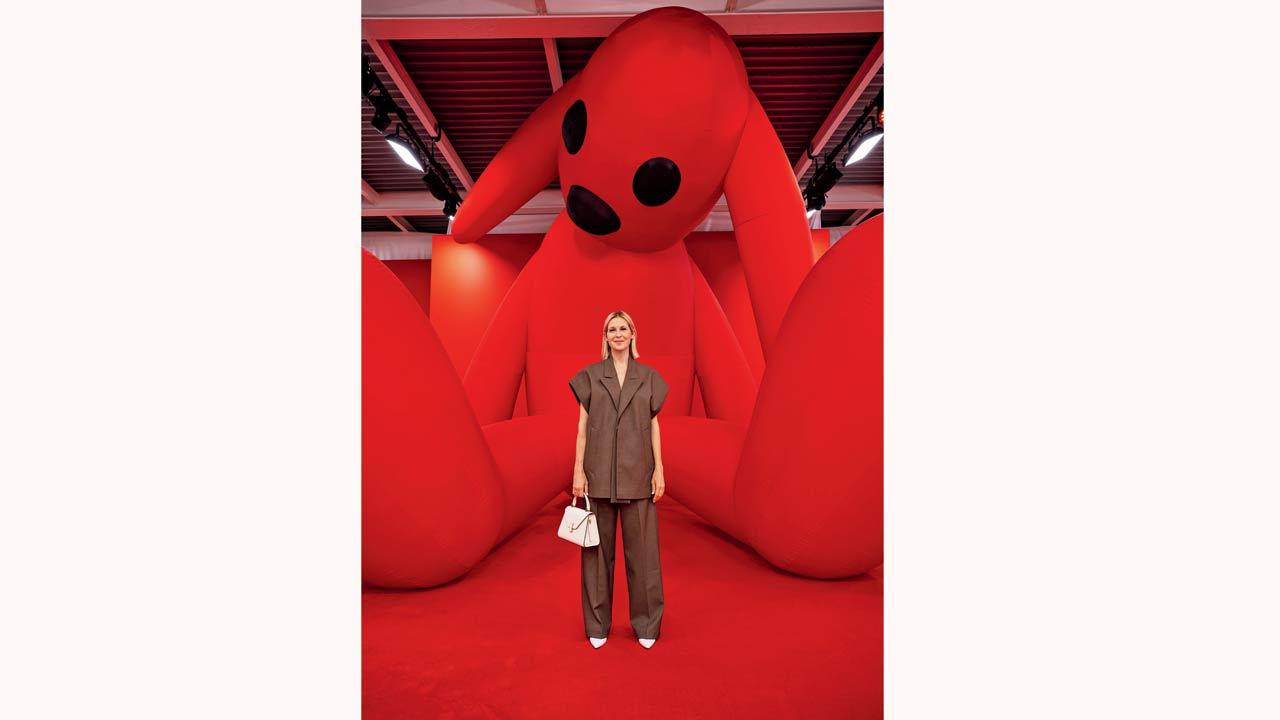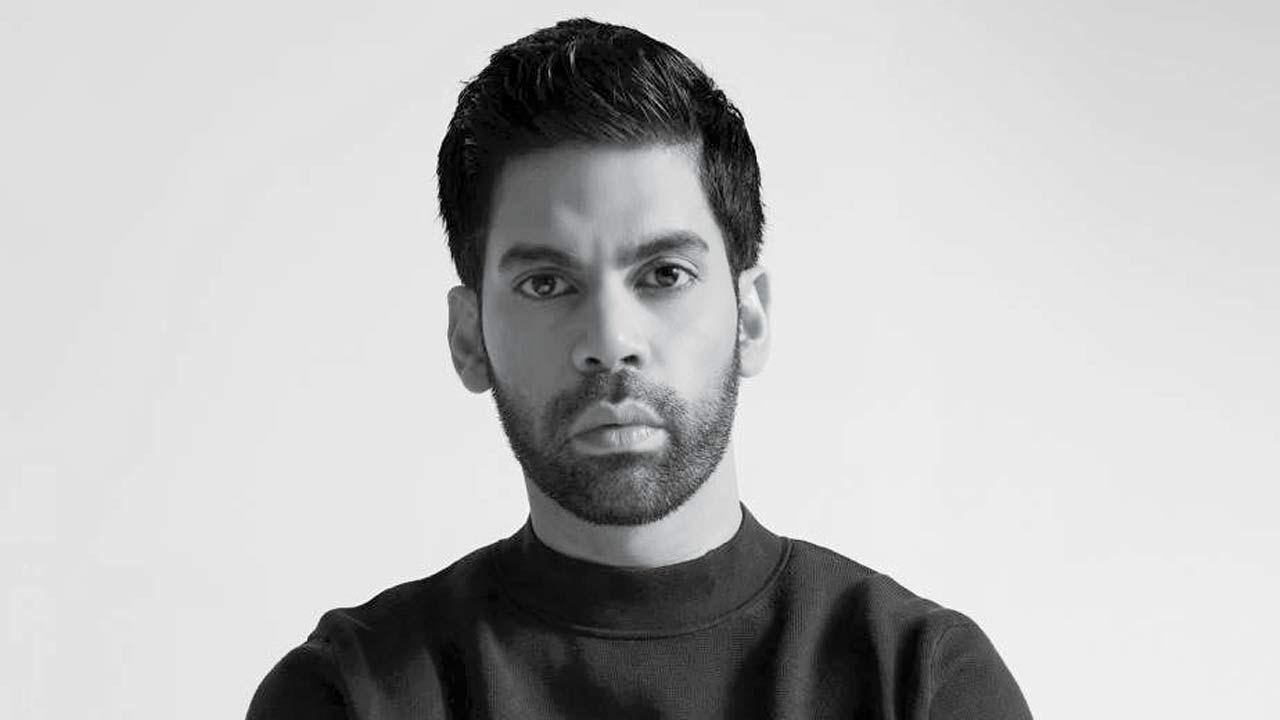In a moment of global unease, could the next big thing in menswear be… an inflatable rabbit?

Dhruv Kapoor partnered with Italian shoemaker Marsell and sustainable eyewear brand, Junk Plastic Rehab, known for using recycled plastic waste, for his S/S 2025 Co-Ed collection at Milan Fashion Week on June 17. Pics Courtesy/Alessandro Galatoli
 When Dhruv Kapoor took a bow at his Milan Fashion Week (MFW) Spring/Summer 2025 Co-Ed show on June 17, he hinted at just that. The Delhi designer anchored his all-red set-piece around a giant inflatable bunny with floppy ears—a whimsical homage to childhood nostalgia that infused the collection with a slouchy, youthful and insouciant energy. This playful motif adorned outfits like a two-piece denim ensemble, a cosy pyjama set with bunnies appliquéd, and an embroidered LBD with a sweetheart neckline.
When Dhruv Kapoor took a bow at his Milan Fashion Week (MFW) Spring/Summer 2025 Co-Ed show on June 17, he hinted at just that. The Delhi designer anchored his all-red set-piece around a giant inflatable bunny with floppy ears—a whimsical homage to childhood nostalgia that infused the collection with a slouchy, youthful and insouciant energy. This playful motif adorned outfits like a two-piece denim ensemble, a cosy pyjama set with bunnies appliquéd, and an embroidered LBD with a sweetheart neckline.
ADVERTISEMENT
“We stumbled upon this expansive industrial space at Via Tortona, 27, and I wanted to inject a lively carnival vibe that triggers nostalgia. The bunny idea comes from my own childhood—I had a beige teddy named Junior—but I chose a red bunny for impact,” explains Kapoor, 35, speaking from Milan.
 American actor Kelly Rutherford
American actor Kelly Rutherford
Kapoor made a career translating emotions into wearable art, but even he was surprised by how closely his recent work resonated with adults. “NBA player Jaren Jackson Jr. attended the show. Standing nearly 7 feet tall, he hugged the giant bunny; that was a memorable highlight for me,” Kapoor recalls, suggesting a shift in men’s fashion to a more playful, creative direction that embraces vulnerability and softness.
Some designers lead us towards new styles, while others simply mirror the world. Kapoor, now in his fifth MFW season, does both. Since founding his namesake label in 2013, Kapoor achieved what established designers strive for: a globally recognised brand with a distinctive aesthetic, available across Europe, Japan, Korea, Australia, the Middle East, the US, besides India.
 Dhruv Kapoor
Dhruv Kapoor
Casual mixing of traditional couture, modern tailoring and commercial acumen, and a gender-fluid approach defines his brand. (At his MFW show, female models appeared on the runway in designs that matched menswear.) Kapoor muses on the dichotomy between tradition and high-tech, linear and rounded, and the balance between armour and adornment—a testament to the brand’s enduringly strange romance.
Ask him about the inspiration behind the show, and he will lead you through the ebb and flow of childhood reflections shared by many. “As kids, we borrowed from our father or older sibling’s closet because their clothes made us feel more grown-up. Yet, as we grow older, everything around us—the spaces we inhabit or even our skincare routines—seem to push us to look younger!”
Formality was maintained through precise creases and pressing the shapes to papery flatness. “When building and styling the collection, the criteria was: how would a child dress an adult, or how would an adult dress their child,” he explains. He didn’t slap on a print or use empty references. For example, the hand-sketched collage print shirts looked like they had leafed through a scrapbook, while the T-shirts emblazoned with phrases like, “I dreamt we spoke again” and “We were lovers in a past life” conveyed an ultra-specific romantic mood.
The microscopic beadwork on denim jackets, which required 1000 man-hours to perfect, ingeniously combined couture techniques with a sporty attitude. “Our goal is to push Indian craft beyond the traditional leitmotif of gold or paisley. Our clothes are always designed to evoke emotions.”
The ‘Kapoor’ logo in Devanagari, prominently displayed on the front, back, and waistline, has evolved into a community stamp. Its origins stem from Kapoor’s boarding school days, where garments were labelled to prevent misplacement among students. “Initially, I didn’t expect it [logo] to blow up, and represent a language and a mindset. Luckily, with many Bollywood personalities sharing the same last name, I decided to trademark it and push it out.”
This season, Kapoor scaled back on the volume of previous collections, focusing on evolution rather than revolution. Pieces seamlessly melded together, much like the spontaneity of real life. Nineties classics such as bucket hats, utility-style gilets, denim jackets, and flared jeans interplayed with wistful glamour of pussy-bow shirts, safari suit-like co-ord sets, trench coats and summer jorts.
And the collection’s curveball? Beaded denim jackets may well be the new haute couture.
 Subscribe today by clicking the link and stay updated with the latest news!" Click here!
Subscribe today by clicking the link and stay updated with the latest news!" Click here!







